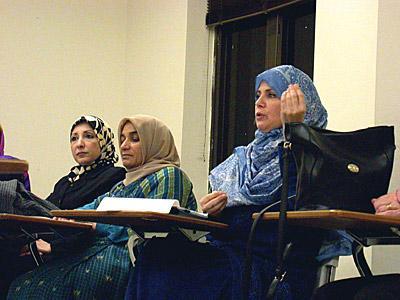When Eman Mohammad left Iraq 20 years ago, she was not sure when and if she would see her relatives again; and with the Bush administration’s threat of war looming against her home country, she said she is less and less sure.
Mohammad, whose husband is a professor at the University, said she opposes the possible war for fear her mother, father, brothers and sisters living near the capital will be among the innocent civilian casualties.
“A war will eat people,” Mohammad said.
The protests against the United States’ threat of war against Iraq spilled over onto campus Tuesday as the Center for Alternatives for War in Iraq sponsored informal panel discussions in preparation for the Bush administration forum on Iraq being held tonight.
Mohammad participated in a panel discussion entitled “Women and Islam.” No panelists expressed support for the war effort.
The Muslim students on campus feel a strong attachment to the Iraqi people, said Muaz Khalil, a graduate student in kinesiology and former president of the Muslim Student Association.
“We don’t see it as an Arab or a Muslim issue,” said Khalil. “It’s a humanitarian issue.”
The loss of innocent life was the primary reason for war opposition among the panelists.
Kaneez Fatima, president of the Muslim Student Association Sisters Wing, said the Iraqi people suffered during and after the Gulf War. Millions of children died from economic sanctions from 1990-1998, she said.
“Fighting is not the solution for peace,” Fatima said.
When asked whether the Iraqi people would be better off liberated than under the rule of Saddam Hussein, Mohammad, who voted for Bush in the last presidential election, said the Iraqi people will be in misery either way.
“Do you think Saddam will send his sons, his nephews into the war?” Mohammad asked. “No, it will be my nephews.”
Khalil said the situation for the Iraqi people is a difficult one.
“We understand that bombing them won’t get them out of their misery,” Khalil said. “It’s a no-win situation.”
Kudsia Haque, Ph.D., a panelist born and raised in India, said the American people have a faulty idea that Islam is a religion of terror.
The reason she migrated to America was for the freedom and the friendliness of the American people, Haque said. That freedom has been taken away for Muslims, she said.
Omaya Jazairli, a panelist from Damascus, Syria, said only a small minority of Muslims identify with Osama bin Laden. It would be like Christians identifying with Timothy McVeigh, she said.
“Do not label us as Osama bin Laden or Timothy McVeigh,” Jazairli said. “We are not.”
Forum held in opposition of Iraq war
February 19, 2003

Forum held in opposition of Iraq war



